EIC Research Series EP2 : Why is gig so painful?
First things first, we should start by clarifying that the word “gig” here has nothing to do with either “more than a friend but less than a lover” relationships or the act of cheating, as many would presume. The two words may sound the same (in Thai) but their meanings are totally different.
EIC Research Series: About gigs EP2
By: Kunyaruk Naiyaraksaree
![iStock-465347492 [Converted]-01.png](https://www.scbeic.com/stocks/product/o0x0/yx/9k/evr5yx9k81/iStock-465347492_%5BConverted%5D-01.png)
You may find the title of this episode a little off.
“Earlier didn’t you say everybody wants to get a gig? Then how can it be painful?” you might ask.
Indeed, even though the gig crowd seems to be living perfect lives (for more about the perks of being gig workers, please see our previous episode), their freedom actually come at an expensive cost.
Our EIC survey shows that not all gig workers are happy with their freedom. In fact, some of them want to switch to full-time work, especially those who are not making that much money and those who used to work full-time before.
Ask someone with a gig, and he or she will say there’s no such thing as a free lunch. Gig worker’s freedom is anything but free.
But why? How can a gig worker’s life be so painful?
There’s no free lunch for freelance workers
Pain point number one: Uncertain income. This is the most popular answer we received in our survey (80% of the gig workers picked this). Freelancers don’t enjoy the luxury of knowing when their next job will come. And since the job itself is unpredictable, so is the income. This is a stark difference from full-timers who never have any doubt if they will have enough money in their pocket come next month.
Also, it may sound great to get to choose whatever jobs you want, but in reality it’s not always you who get to choose. Don’t forget that you’re not the only one who can and is willing to work. And if the task requires only basic skills, your competition is plenty, someone else can replace you in no time.
Just imagine that you are a freelancer, perhaps a wedding photographer. Wedding couples, your potential clients, will search for the right photographer for their big day. So unless you have the style they want or get along well with them they will choose someone else. It is no wonder that gig workers feel a constant fear that someone with similar skills can snatch their jobs away anytime.
Pain point number two: No job benefits, no holidays. The gig crowd doesn’t enjoy the usual job benefits that full-timers do, such as health insurance, work uniforms, holidays, transportation subsidies, bonuses, or pension funds. Indeed, it is these benefits that make gig workers green with envy.
Granted, holidays and bonuses might not be too big of a deal if gig workers carefully plan out their schedules. But health insurance really makes the difference. When they get sick, gig workers have to choose between going to a public hospital super early in the morning and still face long lines, or going to a private one for more convenience just to get even more ill once they see the bills. No one wants to get sick, but our bodies probably won't listen.
The gig crowd also complains of a few other difficulties. For example, it is hard for them to apply for bank loans because they don’t have good collateral. Applying for visas is also a challenge as they don’t have an authorized work certificate. Working alone can also feel like being cut off from society. And what can be worse than an overly demanding client who does not honor a contract and delays payment. All these headaches make gig workers want to scream “I didn’t sign up for this!
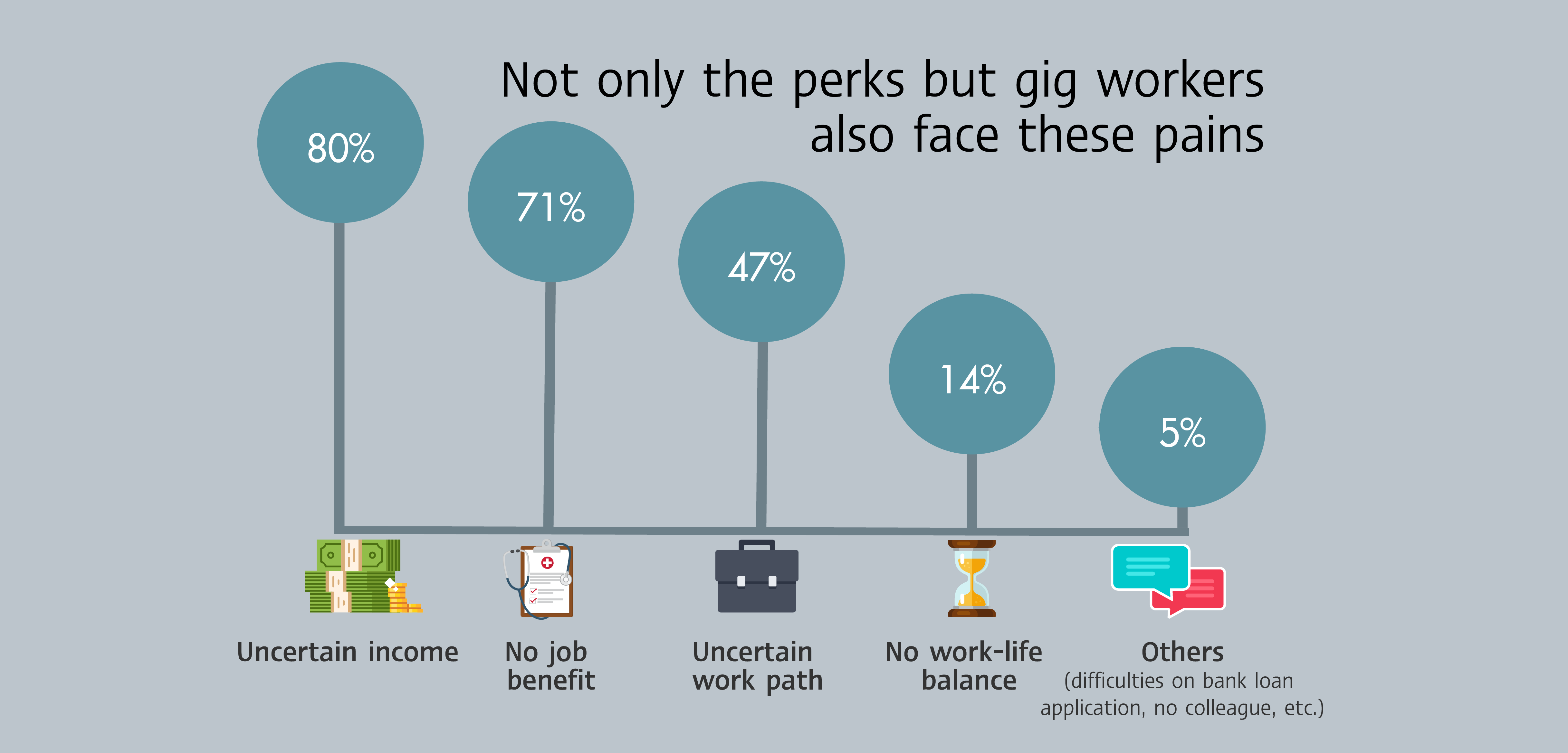
Source: EIC analysis based on EIC survey as of August 2017
A survival guide for gig workers
Being a gig worker sounds painful, but 80% of gig workers (who don’t also have full-time jobs) are still happy with the situation, and more than half do not wish to switch to full-time jobs. Even as their freedom comes at a high cost, they’re willing to stick with it.
Are there any secrets to survival?
Look no further, we’ve got them all here for you.
1. Master time management. For gig workers, the one key to success is effective time management. This includes prioritizing tasks to see what should be done first. This is especially true for those who work on many jobs at the same time. Also, they have to learn to carve out some personal time for relaxing, spending on their own, or enjoying friends and family. With good time management, the work-life balance that everyone is chasing will be well within reach
2. Make connections. Who said connections don’t matter? Our survey shows that most gig workers find their jobs through social connections, including direct personal contacts, mutual friends, and social media. Therefore, the ability to connect with people is among the most important skills gig workers need. The more people they know, the more jobs they can get their hands on. Useful connections are not limited to ones with clients, but also others in the same profession. For example, if you are an independent lawyer, then you should get to know other lawyers too so that a friend can replace you if for some reason you can’t finish a job you have accepted, and vice versa.
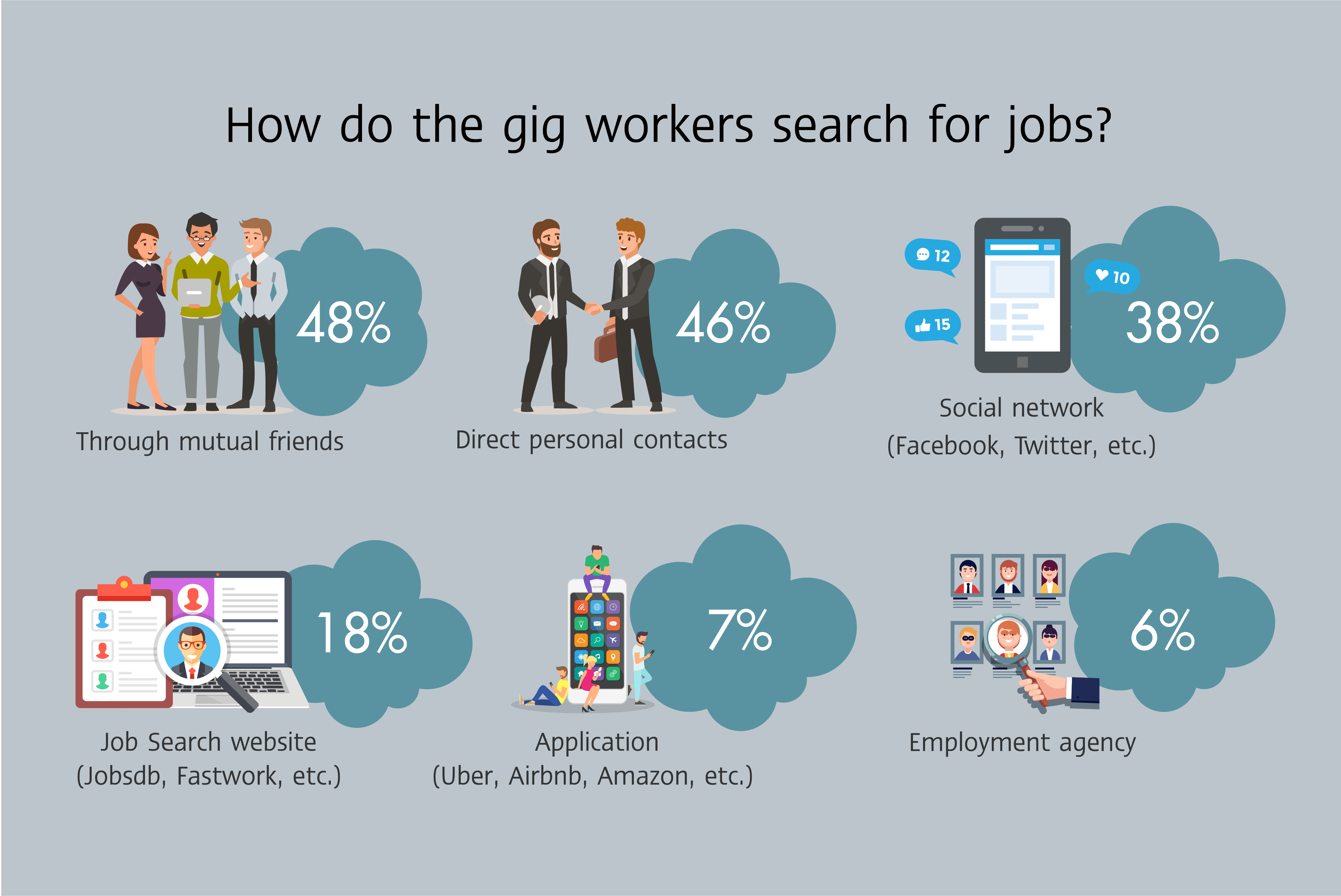
Source: EIC analysis based on EIC survey as of August 2017
3. Acquire a variety of skills or unique skills. Skills are what sets one apart from others. Similar to regular jobs, whoever performs better will get the next project. Our friend who is a freelance Japanese interpreter told us that although there are plenty of people who can speak Japanese, only a handful have enough vocabulary bank to work as an interpreter. That’s why the jobs keep coming her way.
4. Passion and happiness. These are often the reasons why people decide to become a gig worker. More importantly, they are the reasons why some stay for the long haul. An independent artist we talked to nicely summarized this point. He said he would stick with being a freelance artist because it makes him happy. And he’s happy not because of the freedom or the money, but because he enjoys the luxury of doing what he really loves.
5. Get ready for changes. As we said earlier, gig workers face higher uncertainty in life than the rest of us. They don’t know how much money they will make or when the next job will come. Plus, big expenses for things like healthcare may suddenly catch them off guard. Therefore, the last and arguably most important survival tip is to always be ready for change. We had a chance to speak to a freelance graphic artist, whose work is so unique that anyone can recognize it. When asked about his secrets for success, he said that he constantly worked on improving his skills, updating his styles, and looking for new perspectives. He realized that whatever he makes today could be copied as soon as tomorrow, so the only way to avoid being replaced is to always offer fresh and innovative work.
In fact, this last tip can be applied to anyone, whether you’re a gig worker, a full-timer, or whatever else. If you’re adaptable, open to change, and never stop improving, then you can keep your chin up through any changes that may come your way, be it a new job or even a lay off.
And that’s what we call a boss!
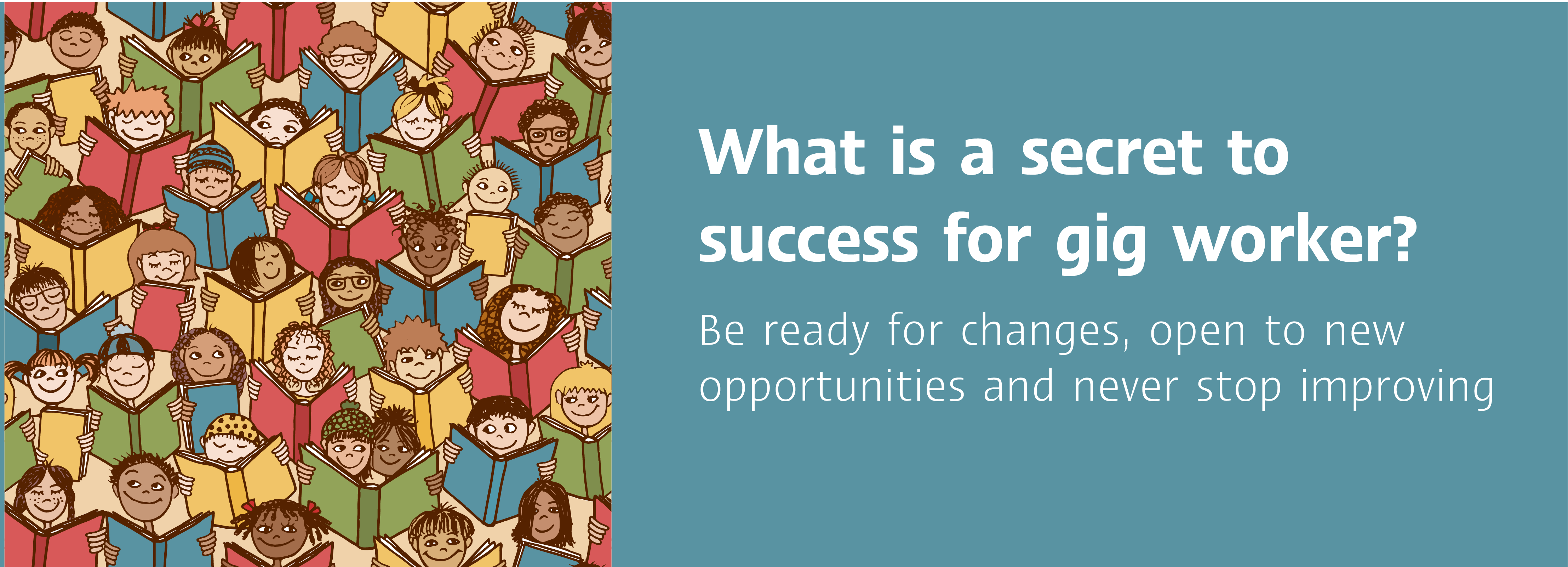
Q&A with the gig workers
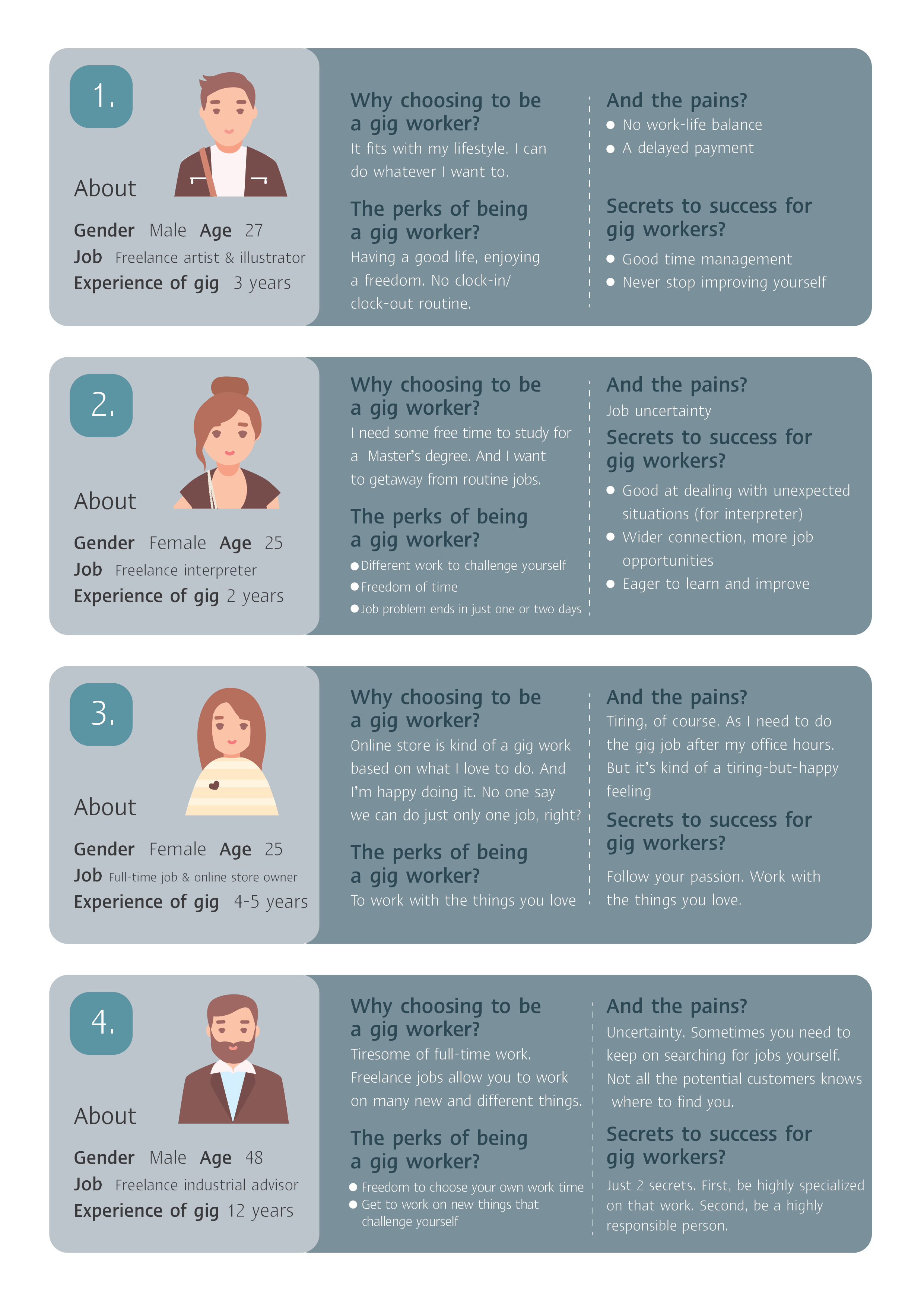
To gig or not to gig?
Up to here, many of you may be asking yourselves
“To gig or not to gig? What is really the right job for me?”
For the first question, it depends on each person’s preferences. Let’s say that you ask your grandparents what they would think if you quit your job to become a freelancer. We don’t need to know your grandparents to guarantee that you will be scolded for throwing out the window oh-so-dear job security. But instead, if you ask fresh graduates they will say go ahead and follow your heart! Can you see? Different generations already disagree on this.
As for the second question, look for jobs that suit you.
On the one hand, gigs can be perfect for you if you love freedom. But on the other hand, full-time jobs would serve you better if you value certainty. Put another way, if you have a “I need cash in my pocket every month and health insurance to pay all my hospital bills” kind of mindset a full-time job is probably best for you.
Remember too that you can’t always just do whatever you want. Life always comes with constraints. For instance, if you have to pay for a house or car, then you need a rather certain income stream. In this case, a full-time job would be a better bet. At the same time, many choose to gig out of necessity as it is the only way they can make time for their families.
So to sum up, in order to decide if a gig lifestyle is right for you think about your preferences and constraints. Carefully weigh the pros and cons of each type of job and decide for yourself. Just remember that there’s no right or wrong answer when it comes to this.
Or better yet, try both if you have a chance. There is a Thai saying that goes, “one look is better than ten hearsays.” Just one chance of trying it out is better than a hundred looks, too.
Now back to our first question.
To gig or not to gig?
Do you know your answer now?
.
.
.
P.S. For those out there who are still unsure, we will not leave you stranded. Try out this quiz to see if a gig is right for you.
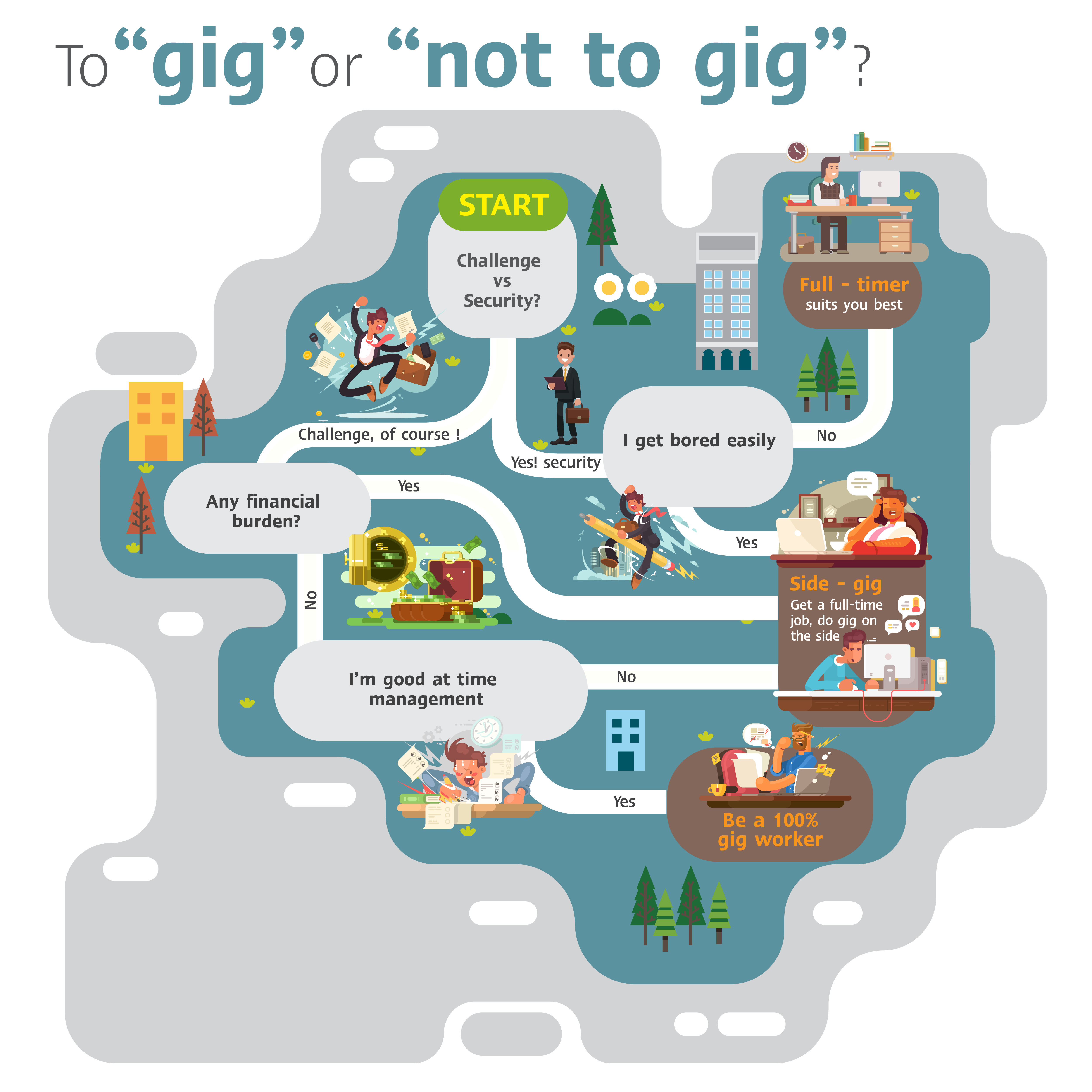
Not satisfied with the answer? Still undecided? Keep calm, here are more quizzes for you!
https://www.fieldnation.com/technician-blog/freelance-quiz
https://www.policybee.co.uk/freelancing/should-i-go-freelance.aspx